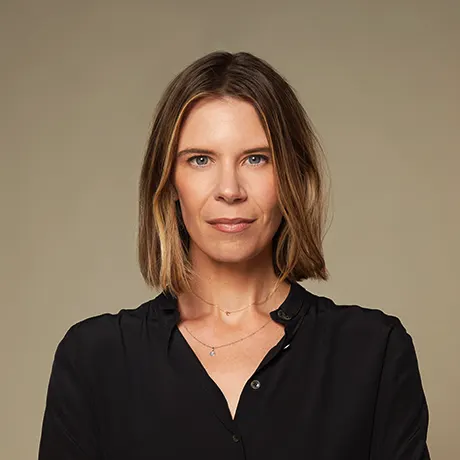ADHD, working memory, and feeling like a “burden” (Pablo’s story)
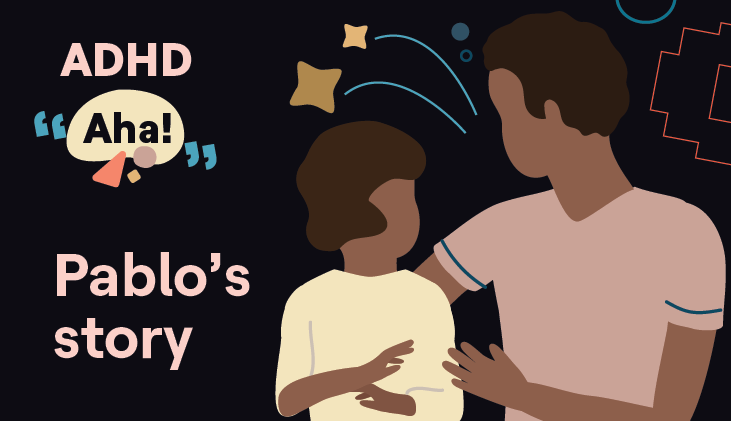
Stay in the know
All our latest podcasts delivered right to your inbox.
Pablo Chavez is forgetful and easily distracted, and he has trouble managing emotions. He’s also a playful, fun dad. He has a unique bond with his daughter, who has autism. When Pablo’s wife Britney noticed his trouble with working memory, she encouraged him to get evaluated for ADHD. Pablo reflects on how his ADHD-related challenges can sometimes make him feel like a “burden” at home. But also how his positive attitude brings joy to people around him.
We learned about Pablo’s story because he wrote to us! We love hearing from our listeners. You can email us at ADHDAha@understood.org.
Related resources
Podcast transcript
Pablo: So, my biggest "aha" moment was my wife pushing me to get the diagnosis, you know, after we had several years of a big roller coaster of really high highs and really low lows, depression, and anxiety from dealing with my issues. She was like, no, that's it. You know, something has to change.
Laura: From the Understood Podcast Network, this is "ADHD Aha!" — a podcast where people share the moment when it finally clicked that they or someone they know has ADHD. My name is Laura Key. I'm the editorial director here at Understood. And as someone who's had my own ADHD "aha" moment, I'll be your host.
I'm here today with Pablo Chavez. Pablo is an electrician, husband, and a father of two who lives in California. And Pablo got in touch with us via email. He wrote in to us to talk to us about the show and share his story. And I was so compelled that I wanted to invite him on. So thanks for coming on, Pablo, and thanks for emailing us.
Pablo: Of course. Thank you, Laura, for having me.
Laura: And for anyone who is listening and is interested in sharing their story, the email address is ADHDAha@understood.org. I read all of the emails that come in. I don't always have time to respond right away, but I'm just so thrilled to be hearing from amazing people like you, who are listening to the show and want to share their own story.
Pablo: It's honestly a really great podcast. I've heard a couple stories twice already.
Laura: Thank you. That means a lot to me. How about, I would love to know, when did you get diagnosed with ADHD?
Pablo: September/October of 2021 was when I officially got diagnosed.
Laura: What led to your seeking out an evaluation and getting diagnosed with ADHD?
Pablo: That's kind of like a two-part series because I struggled during a change of positions at work, having to do with a lot more memorization, computer skills, scheduling, planning that I'm not very strong in. So my boss would often get onto me. Like how could you forget? It's on your schedule? It's on your plan.
Laura: What do you do again?
Pablo: I'm a union electrician, subcategorized as a low-voltage electrician. And we deal with a lot of systems such as access control, data networks, CCTV, fire, alarm, DAS systems, fiber optics. So I'm in communications. I'm actually at Airbnb, their headquarters in San Francisco. So my company is contracted through Airbnb to manage their access control systems globally. So we manage 16 sites, from Beijing, Singapore, Sydney, Paris, Dublin, Portland, Montreal. Yeah, all over the place.
Laura: Wow. So you have a lot of responsibility. That sounds like a lot to manage.
Pablo: Yeah, it is. It is. And so we got to a yearly review, and that's when they told me, like, your performance isn't up to par. It's not doing very well. You need to step up. Them telling me that pushed me to start seeking help. That's when my wife told me, so what do you think about
ADHD? You know, maybe your symptoms coincide with what ADHD is.
Laura: So what was she noticing?
Pablo: Memory was the biggest part, to be honest. Just even going to the store, she'd send me for two or three things. I'd forget at least one, or I'd have to call her multiple times. What was it again? What was it again?
One thing she did mention often was that usually at parties, I would often ditch her. Not purposely, right? Just go, oh, I'm going to say hi to these guys really quick. And then I'd get caught up with them and jump to another group and go to another group. And at the end of the night, she'd be fairly upset. You know, you barely hung out with me, you know.
And that — I can understand why someone would feel that way. Why people would be like upset after their significant other just didn't hang out with them in an uncomfortable setting for her. 'Cause she's an introvert.
I'm very much an extrovert. So it's just me not purposefully ignoring her, just accidentally getting caught up in other things.
Laura: Give me an example. You're bouncing around, you're at a party and you're talking to someone. And then what happens? And you move on to something else. Tell me about that.
Pablo: Yeah. I just get — my wife likes to call it giddy. I get really giddy, really childlike and playful energy. And I just bounce around, conversate. Get excited. People seem eager to talk to me because I usually seem so interested because of that giddiness. I like to learn. I like to hear stories. I guess I like interaction. It's soothing. It's fun.
Laura: I imagine that was one of the things that really drew her to you. That giddiness, that playfulness.
Pablo: Yeah, that's what she mentioned. And as soon as I started taking medicine, she was a little concerned. She thought I wouldn't be myself anymore, just from stories she's heard.
Laura: Was that the case for you, or did you maintain your giddiness?
Pablo: Oh yeah, very much.
Laura: I'd like to go back to that conversation with your wife when she first suggested, could you maybe have ADHD? Do you remember what she said to you?
Pablo: She brought up a lot of symptoms. Like I would have some extreme mood swings. I'd either be really happy or really mad or upset. And the way I express my anger by shutting down, I just shut down. I just don't talk. No eye contact. I'm barely even there.
Laura: So maybe some trouble managing emotions. Is that accurate?
Pablo: Yes, very much so. Very much so.
Laura: That's really common actually, Pablo. People with ADHD, you know, they might tend to feel anger and frustration and disappointment more intensely than others. That's related to trouble with executive functioning.
Pablo: Yes. Oh, that was the other one. Executive function. I would get stuck nowhere, knowing I had a lot of things to do, but just was not able to start. Or I'd be hyperfocused on a few things, one thing, maybe just all day complete clearness.
Laura: What you were describing to me earlier in the conversation, it sounded like trouble with working memory, which is absolutely a sign of ADHD. It's like the sticky note in your brain where you're storing that short-term information.
Pablo: Exactly. I heard a perfect analogy of that, that helped, kind of help me explain to my wife and a lot of other people about what ADHD is. So imagine having a list of tasks. And then there are sticky notes or there are little cards. Now put them on a desk and shuffle them. That's my memory. That's the order I have to go in. You know, which one — I don't remember. I have to kind of look through, sort, every time.
Laura: Pablo, I used to be a server at a restaurant — at a karaoke restaurant of all places. I remember having to keep track of people's orders. Like I would furiously write them down. I was — I have to tell everybody, I was actually a really great server. But I was so hyperaware that I struggled with working memory that I just, I never missed a beat, right? I always, I wrote everything down to the point where I would stay
at their table a little bit too long, but I never forgot anything. Because I wrote it down.
Pablo: We're adaptive like that. I think that's kind of what drives us a little bit is knowing that fault. And I am a perfectionist. My wife calls me a perfectionist, and I am very much so. I am "go big or don't do it" type of attitude. And my giddiness is always "go big." Don't shy away. Do it.
Laura: When we last spoke, you mentioned that you felt like a burden.
Pablo: Yes, very much so. I think that just has to do with the rejection sensitivity, I believe it's called. I think that affects me quite a bit. I remember growing up, I was afraid of a lot of things. A lot of things. I was an illegal immigrant as a child. And I think that pushed me back further, and it just kind of heightened my rejection sensitivity. Always felt like a burden. I just felt very quiet. Like I would rely on people to say things for me. And growing up, it was pretty much the same, except I was a lot more confident. Because I learned to mask a lot of my symptoms, and it would be portrayed as quiet and scary.
Laura: You felt like people perceived you as being quiet and scary?
Pablo: Oh no, I know. They told me.
Laura: They told you.
Pablo: Yeah. I was really fit in high school. I was starting quarterback for the high school and a pitcher and outfielder for baseball. And I went all-league for baseball. We didn't do too good in football, though, but had an up and coming quarterback, right, a freshman. And he told me that I was really scary, really scary, you know, quiet, scary, serious. And as soon as we started practicing and he got to know me, he was like, dude, you are so funny. You're hilarious. You're so cool. I can't believe I was afraid of you.
Laura: That's a big difference between how you described yourself before in terms of being giddy and the fun parents. So you were hiding a lot.
Pablo: I was very much masking a lot of my symptoms in high school.
Laura: So that feeling like a burden, Pablo, did that change at all after you got diagnosed?
Pablo: No. No. I don't think it'll ever change because I don't really have control over my symptoms. I feel like I always have to rely on people more than I should. And it's just, it's something I don't want to do. I'm learning to accept it. I'm learning that, you know, like my wife wants to help me. She's very forgiving. She's very tender, I guess you could call it. I'm not sure. I'm trying to find the right word, but I just can't think of it, but she's just, she's just a special person.
Laura: You have two children as well, right?
Pablo: Yes. Two children. They are fun. I'm the fun parent, unfortunately. So they come to me. My daughter, she has autism. She's 6 years old now. She likes roughhousing quite a bit. She likes very much sensory play, and I'm more physical. I'm stronger. I'm, you know, I'm just more hands-on with her than my wife would be. She likes to do a lot more crafts and building blocks and toys where you kind of have to sit and stay.
Laura: And being a dad with ADHD, what does that mean to you?
Pablo: It's a struggle. With my executive dysfunction, I tend to put their needs second often. So let's say, like my wife steps out for the day. She has, you know, has a girls' day. She's going to go get her toes done with her sisters, which was actually this last weekend, right? So my day basically consists of just kind of keeping them happy, just whatever they need when they get upset or they tell me something like they're hungry.
And I often forget until they tell me like three or four times. "Hey Dad, I'm hungry." You're right. You're hungry. It's 3:00, past lunch. Let's go get something to eat. But it takes a couple of times to really get me to notice that he's hungry or my daughter's upset. And I just kind of brush her off for a second. Cause I'm busy cleaning or doing another task around the house. And until she has a large meltdown, then I'm like, oh crap. Why is she having a meltdown? Oh, that's right. She told me a couple of times already in her own way.
Laura: So your daughter, she's 5, is that right?
Pablo: She just turned 6.
Laura: She just turned 6, and she has autism. Do you relate to her more now that you have a diagnosis?
Pablo: I don't relate to her more? I've always had a special bond with her. Me and her, we just, we click. I don't know what it is. We just, we understand each other. And my wife gets so jealous about it, because the way me and her just play and she looks at me and we just get each other's movements. I don't know what it is. It's like synchronized, really.
And even out in public, everybody looks at us when we're in line. 'Cause she's playing with me, I'm holding her. And I've had multiple times people tell me "You and your daughter are so cute. You guys have such a cute bond."
Laura: That makes a lot of sense to me. I mean, ADHD is not on the autism spectrum, but ADHD and autism can be related in a lot of ways. They have a lot of overlapping symptoms. That relatability, is that there for you?
Pablo: Yeah, yeah. Very much so. When I'm focused and I am paying attention to my kids, especially to my daughter, I can kind of see what she wants. Kind of just think her thoughts, if that makes any sense. You know, like, oh no, she just wants this. And as soon as you do that, that play, that activity, or give her that toy, she's like, oh yeah, that's what I wanted.
Laura: Does your daughter need a lot of structure?
Pablo: She thrives on structure, but she is not opposed to change. It's kind of like, she thrives on routine, but she's very adaptive.
Laura: It sounds like she adapts to you.
Pablo: I'm her safe space. I'm her safe zone.
Laura: Tell me more about that.
Pablo: Yeah. When she gets uncomfortable, she just usually tries to gravitate towards me to hold her, to keep her comfortable, safe, I guess. I'm not sure. Honestly, I just know she likes to be with me in uncomfortable situations. I tend to calm her down quite a bit. I play with her and get her mind off of the situation, the new surroundings, noise, etc. I just tend to put her back in her little bubble and then slowly expand.
Laura: How about — my wish for you is that you don't feel like a burden, you know?
Pablo: Thank you. Yeah, I hope it slowly fades. Because I think that's what I was trying to get at when I was younger, being an immigrant, being scared. And I'm not a citizen yet. I'm a resident working to get my citizenship, but now that it's been probably like six years now, I see myself breaking out of that shell of being scared, being timid. I'm finding my voice now. You know what I mean? And I think with time I will get out of that feeling of being a burden.
Laura: I hope so.
Pablo: Thank you.
Laura: Are you happy that you got diagnosed with ADHD?
Pablo: I'm very much happy. I felt relieved knowing that we have a name for this, that it's not just I'm lazy, or I don't care or things like that. That hurts, you know, that stings. That really, really bothers me sometimes still. And I think it's just getting past that. Letting people know that it's not that I don't care. I care a lot.
Laura: You've been listening to "ADHD Aha!" from the Understood Podcast Network. You can listen and subscribe to "ADHD Aha!" on Apple, Spotify, or anywhere you get your podcasts. And if you like what you heard today, tell someone about the show. We rely on listeners like you to reach and support more people. And if you want to share your own "aha" moment, email us at ADHDAha@understood.org. I'd love to hear from you. You can go to u.org/ADHDAha to find details on each episode and related resources. That's the letter U, as in Understood, dot O R G slash ADHDAha. Understood is a nonprofit and social impact organization. We have no affiliation with pharmaceutical companies. Learn more at understood.org/mission. "ADHD Aha!" is produced by Jessamine Molli. Say hi, Jessamine.
Jessamine: Hi, everyone.
Laura: Justin D. Wright created our music. Seth Melnick and Briana Berry are our production directors. Scott Cocchiere is our creative director. And I'm your host, Laura Key, editorial director at Understood. Thanks so much for listening.
Host
Latest episodes
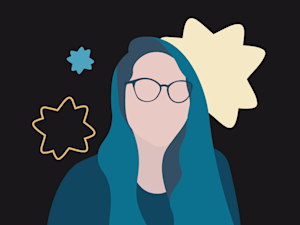
April 16, 2024
ADHD coach Jaye Lin was a gifted kid with undiagnosed ADHD. Now, she’s building communities and helping others cope with ADHD burnout.
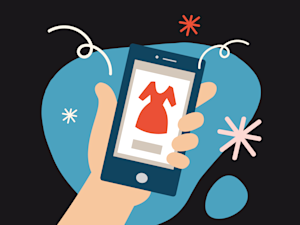
April 2, 2024
Writer Paulette Perhach had money coming in but struggled to keep it in her bank account. An ADHD diagnosis brought her struggles into perspective.
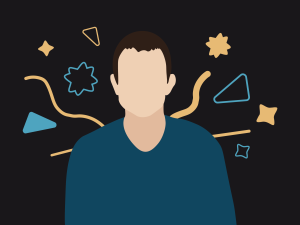
March 19, 2024
Eye to Eye founder David Flink is fighting the “just try harder” myth surrounding ADHD, dyslexia, and other learning and thinking differences.
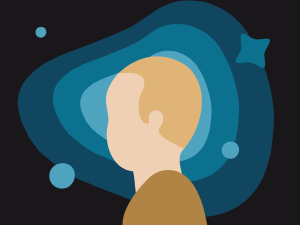
March 5, 2024
Peter Jones used to feel better saying he had a hearing problem rather than considering ADHD. Now, he knows he has ADHD and isn't afraid to say it.
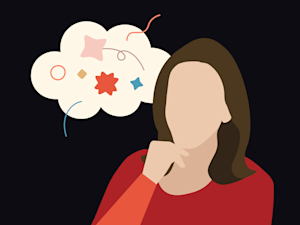
February 20, 2024
Before her ADHD diagnosis, ADHD coach Emily Weinberg thought she was just lazy. But in reality she was stuck in “analysis paralysis.”
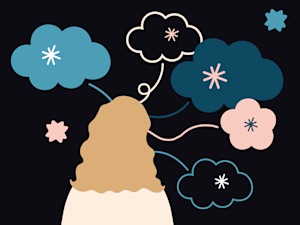
Carol Blumenstein was called an unteachable student. Now, she knows she has ADHD and dyslexia, and supports her five kids who learn differently, too.

January 23, 2024
Executive coach, actor, and former criminal defense attorney Ernest Anemone shares his ADHD story — and why he questions the term “attention deficit.”
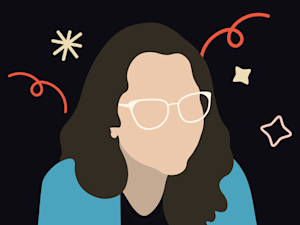
January 9, 2024
ADHD and post-traumatic stress disorder (PTSD) symptoms can look similar. And they can morph into what Hannah calls “a trauma ball of blame.”
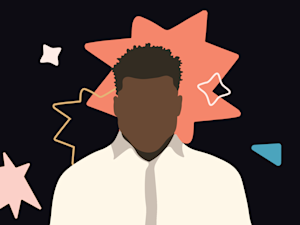
December 26, 2023
Livingston Steele was diagnosed with ADHD about a year into working at Understood.org. His experience and work have given him immense empathy for people with ADHD.
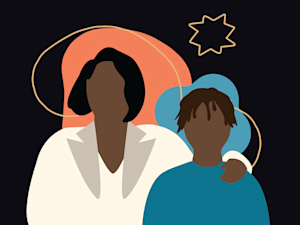
December 12, 2023
Wendy Zanders is a decluttering coach with ADHD. Find out how she got into organizing, and get a few tips for yourself.
